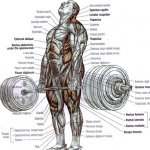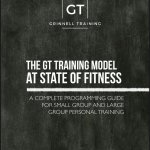There are a few things that need to happen in order to produce muscle growth. You need to use significant load when lifting weights Enough time under tension to create structural damage to the muscle tissue Enough stimuli to up-regulate anabolic hormones and increase protein synthesis Proper recovery and workout nutrition Many people often think that if they lift as heavy as possible, or use as much volume (sets and reps) as possible they will […]
Why You Plateau and 5 Ways to Break Through It
Plateauing or plateau – a state of little or no change following a period of activity or progress.
During my time as a trainer, I have heard the word “plateau” used all too often. Oftentimes it is simply because someone does not feel that there are getting anywhere with their health and fitness goals. They are pounding the pavement with their workouts and staying away from junk food. So, the natural thing to think when you are making no progress yet seem to feel and think that you are working hard is that your body is plateauing. Sometimes it is true and sometimes it just means that you need to make some tweaks to your daily lifestyle and workout habits.
So, in this blog, I want to break down some science (and mindset) and have a conversation about body change and metabolism, cool?
The Plateau
At a high level or even sometimes at a starting point in your journey to change your body, and I know this is a hard pill to swallow, your body doesn’t want to change. Your body kind of wants to stay right where it is unless you make some changes for it to adapt.
The body likes homeostasis – the tendency toward a relatively stable equilibrium between interdependent elements, especially as maintained by physiological processes.
In fact, by nature, the metabolism is always trying to be as efficient as possible, which means it wants to cut corners to burn as few calories as possible. It’s trying to conserve and preserve for the theoretical long winter ahead where there may or may not be food available. Thus, it’s really good at not making the changes you are destined to make.
So, when it comes to body change, whether that’s losing fat, gaining muscle, losing inches or getting stronger, we have some work to do.
And there are certain behavioral habits that will have our metabolism getting more efficient—aka a plateau, especially if you are an avid exerciser or someone who’s under a lot of stress (many variations of stress here).
So, this isn’t anything you need to worry about per se, it’s more about becoming aware of some of your behavioral habits, both with how you are thinking and what you are actually doing, and that may be affecting your ability to continue to make changes. And then figuring out if and how you might want to adjust properly.
So, let’s take a look at some common reasons why a plateau is taking place
1. You are overthinking it all
Don’t overthink what you choose to eat.
Do NOT overthink how you should exercise.
Don’t overthink life.
Trust that you made the right decision and continue to grow.
Yes. You have too much information thrown at you on a daily basis in your social media feeds. Or maybe you know so much that you’re constantly worried about what you should be doing and not do. You question if rice is bad if you need more veggies, or that you are doing enough cardio to burn fat.
You can even have the all or nothing mindset that can make you flip-flop back and forth between a strict diet and workout program, to missing workout day and eating pizza and ice cream.
But there is a middle ground. There’s a way to navigate the middle, where you don’t have to be perfect, but the alternative isn’t just going off the deep end and losing it all.
You can definitely plateau with your results by trying to do it all perfectly, and then when you inevitably can’t (because who could?) you just say the heck with it and quit. My advice instead would be to do a few things consistently and as for the rest, do your best.
Consistency will always trump intensity for the long haul.
2. You don’t chill out enough
Study after study has exemplified the correlation between lack of sleep and an increase in hormones related to hunger and cravings. This also can happen when you overstrain, under eat and become nutrient deficient.
We understand this on a clinical level too, when we get zero sleep, all we crave are sweets and treats. If we exercise too much, we become hungrier and end up eating more calories and junk than our body needs. After all, our brain will think that if we are working really hard we then deserve more food and even treats.
So your results aren’t stalling because you have no drive or determination and are reaching for the sugar to help you bounce back. Plateauing because your hormonal system is getting all out of whack. Not enough sleep, recovery days, and even stressing about what you are doing or not doing can all attribute to increased cortisol (stress hormone), increased hunger (ghrelin), and lower levels of testosterone (important for men and women).
Aim for at least 6-8 hours a night to build back your mental reserves and give your physiology the kind of reset it needs. Take days off from the gym to let your body recover. And most of all don’t overthink things. Trust the process and find patience.
3. You eat too little or not nutrient-dense foods
The problem with many diets is that they eliminate so many good foods. They also cause you to eat too few calories and don’t allow you to get the healthy fats and phytonutrients that your body needs to create a healthy cellular base. If you are not eating sufficient calories, your metabolism compensates and slows down.
Now, this doesn’t mean go out and eat whatever you want because eating a ton will increase metabolism (although it will in the very short term), it means to find an eating model where you’re eating to fuel your training and preferentially choosing nutrient-dense foods, like fruits, veggies, lean protein and healthy fats. Mostly. Like 80-90% of the time.
I like to coach people to eat a little more calories on your workout days and a little less when you don’t work out. Not a huge difference, just enough. Maybe some extra almonds with dried fruit or a super shake after a workout.
I also like to have people supplement with fish oil or another omega-3 food, wheatgrass, spirulina, and chlorella to provide all the micronutrient you may not be getting from your food. I call it a “food insurance policy for your body”.
4. You’re exercising too hard all of the time
It is so easy to fall into the “more is better” conundrum. It makes sense, right? Exercise more, burn more calories, burn more fat. You also may think that doing a hard 2-hour workout after a long day of tailgating will offset the blunders of the previous day. Well, not so fast, it doesn’t’ always work this way. I wish it did because I have tried this myself so many times with no success.
Remember, your metabolism doesn’t keep responding at the same rate all the time to more exercise and a lower caloric intake. Your metabolism adapts based on inputs and a chronic stress situation is going to indicate that it should slow down. That means more recovery after hard workouts (see #2).
Adding more and more exercise to your regiment isn’t necessarily better, you eventually reach a point of diminishing returns and even set yourself up for less progress down the road.
Smart, intense, short-duration metabolic conditioning training (think interval training) can be effective in burning fat and helping maintain muscle. And on the opposite end, low, slow restorative exercise like leisure walking, yoga, mobility work, paddle boarding, and even playing catch in the backyard are all great compliments to a regimented metabolic strength training program.
Balance 1-2 tough metabolic conditioning training sessions a week (like we do at SOF during our Group Conditioning Sessions), with some active play on the side.
5. You’re not lifting weights often enough or heavy enough
Weight training is all about building muscle, getting stronger, and improving your body’s resiliency to injury. It provides more bang for the buck than any other type of exercise. There’s no better use of your time in the gym. I think so many of us just think we need to do more cardio to burn calories and then once we do that, we’ll sprinkle in weight-training here and there to top it off. The “burn” and “sweat” we get from doing lot’s of cardio may be gratifying in the short-term but unfortunately, it doesn’t always result in fat loss and results.
It boosts your metabolism way more than cardio can, lifting is a great detoxifier, and building muscle will help you stay leaner in the long term considering muscle is the most metabolically active tissue in the body. It also keeps your body strong and resilient to injury thus keeping your body more bulletproofs preventing you from being sidelined from working out.
And luckily, you can perform weight training so that you get the cardio effects too!
It’s called Metabolic Resistance Training which we do here at SOF during our Semi-private training sessions.
This is where density training comes to the rescue. Doing higher volume, denser lifting sessions (more reps crammed into less time), you will not only build strength and muscle, but you will also create a nice metabolic disturbance and increase your metabolism.
Busting through plateaus can be done
At some point, we will all experience frustration with our lack of results even when we feel like we are working hard. It’s normal and will happen. Most of the time it just takes some simple tweaks that don’t require a lot of stress or thought. In fact, they may be a lot easier than you think.










Leave a Reply